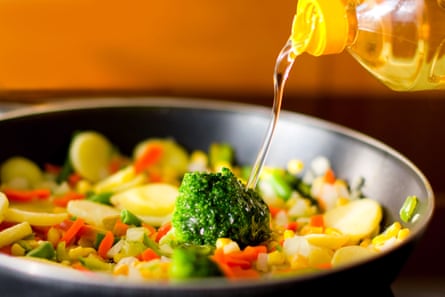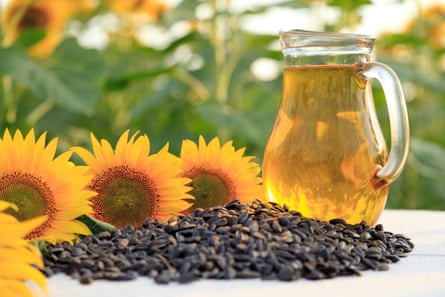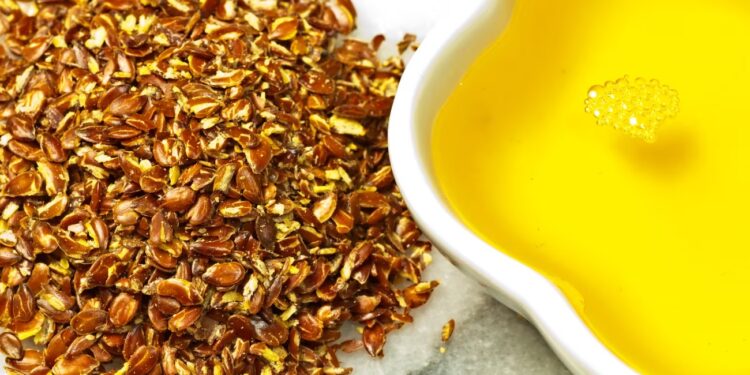Like a host of online influencers, the man likely to be the US’s next health secretary has denounced the vegetable oils used in countless foods. The science is not on their side
eed oils are in many foods. They are usually cheap and easy to cook with, and their inoffensive taste means they can be used in a huge variety of things. Go on any social media platform, though, and you will find self-appointed health influencers blaming them for everything from inflammation to the obesity epidemic. Politicians do it too: the man Donald Trump wants for his health secretary, Robert F Kennedy Jr, has claimed that Americans are being “unknowingly poisoned” by them. But is any of this true, and should it change how you buy or cook your food?
To be clear, seed oils are oils extracted from – well, seeds. In the UK, the most common are rapeseed (known in the US as canola oil) and sunflower (both often called vegetable oil), though you will also find soybean, corn, grapeseed, rice bran and safflower in countless products.
Sarah Berry, a professor of nutritional sciences at King’s College London and chief scientist at the nutritional science company Zoe, says: “In the UK, the largest contributor of fat in most people’s diets is palm oil, which is often used for deep frying.” That isn’t a seed oil, but, she says: “Nearly all the rest of the oils that we consume come from seeds.”
Is that a problem? Well, one of the most common claims online is that seed oils promote inflammation, which – when it occurs excessively – has been linked to, among other things, type 2 diabetes, obesity, cardiovascular disease and cancer. But it is not quite this simple.

“The reason seed oils are often believed to be inflammatory is that many have a high amount of omega-6 fatty acids, a type of polyunsaturated fatty acid,” says Berry. Polyunsaturates are split into two main groups – omega-6 and omega-3. Like the omega-3 fatty acids found in fish and nuts, omega-6 produces chemicals in the body known as eicosanoids, but unlike those produced from omega-3, which tend to have anti-inflammatory effects, omega-6s have some inflammatory properties.
“However – and this is really important – we know that inflammation is a crucial part of the body’s natural processes,” says Berry. “It’s part of our normal physiological reaction to harm, for example. When you cut yourself, the only reason you heal is because you have an inflammatory reaction.”
Problems start if you get too much inflammation in the wrong place and at the wrong time, hence the concern about seed oils. But theory, and even what happens in the lab, don’t seem to account for what goes in our bodies. “There’s overwhelming evidence that seed oils are not inflammatory.”
For example, more than 15 randomised control trials, a type of trial typically considered the gold standard in nutrition and health research, have shown that refined seed oils have no effect on inflammation – and in fact, linoleic acid, which is found in sunflower and grapeseed oils, among others, typically lowers inflammation.

“The idea that we’re going to suffer from inflammation seems to be this mechanistic theory that doesn’t play out in reality,” says Berry. “That’s because our bodies are so clever; what happens in a petri dish or even a mouse isn’t what happens in humans. There have been some good-quality studies done in the UK, for example, that have shown that, as long as you’re getting some omega-3 in your background diet, it doesn’t matter if you’re having a large amount of omega-6.”
Another concern of seed-oil sceptics is how the oil is produced. One way to do this is “cold pressing” – basically, squeezing the seeds so the oil comes out. This works fine but isn’t the most efficient option, because a lot of oil stays inside the seed. The food industry has a couple of solutions to this, including heating the seeds or using a solvent – typically followed by bleaching and deodorising to make the oil look and taste better. The most common solvent used in this process, hexane, is also used in paint thinners and as a cleaning agent, and in high doses, it can be acutely toxic – all common talking points among the so-called health influencers. What isn’t usually acknowledged in these conversations, however, is that hexane is later separated from the oil by distillation and evaporation, and remains only in tiny quantities after processing (the EU allows a maximum residual limit of 1 mg per kilo).
“The trace amounts of hexane that remain are less than what we are exposed to in everyday air pollution,” says dietitian Avery Zanker. “The bleaching process involves using clay to remove impurities, not household bleach. It reduces some nutrients and antioxidants, but does not pose a chemical risk. Overall, there is no strong evidence that these processes in seed oils pose significant health risks.”
Berry says: “From what current evidence there is, I don’t believe that there’s much difference between cooking with refined seed oil and the cold-pressed kind.” She adds the caveat that “there’s very little research on this”, but continues: “What we do know is that in our current food landscape, where we’re a growing population, you’re going to extract a lot more of the oil using refining techniques – and I’m not sure there’s a case for spending the extra money on cold-pressed seed oil unless it’s easily affordable.”

So end-stage oil isn’t as dangerous as online influencers might suggest – but is it good for you? The first thing to consider is the content of unsaturated fats. As well as the polyunsaturates mentioned earlier, seed oils such as safflower and sunflower contain a decent hit of monounsaturates – and both kinds of fat have been linked to health benefits. “They’re important for heart health as they can help lower LDL cholesterol and reduce the risk of heart disease,” says Zenker. “But they also support brain function, maintaining the integrity of our cell membranes.”
They also tend to be high in vitamin E, which is a natural antioxidant – as well as other phytonutrients (plant-derived compounds) that can reduce the risk of chronic diseases, including heart disease, cancer and diabetes. Oils high in unsaturated fats, such as sunflower, safflower and rapeseeed, have also been shown to lower LDL-cholesterol (commonly thought of as the “bad” kind), as well as total cholesterol compared with saturated fats such as butter and lard.

But there’s one more thing to consider: how you cook with these oils, and at what temperature. Every oil has its own “smoke point” – the temperature at which it starts to produce visible smoke – and in some circles, it is thought that cooking above these temperatures with any oil is hazardous to human health. But again, this might be a misinterpretation of what happens in laboratories. “Yes, there’s that great theoretical reason why you shouldn’t cook with, say, sunflower oil,” says Berry. “But in reality, using most home-cooking methods, the evidence shows that you do not produce harmful chemicals using domestic processes. If a seed oil is, let’s say, repeatedly fried, left out in the air, and used for weeks on end, like it might be in a late-night takeaway shop, then, yes, you’re going to get degradation. But frying in sunflower oil or rapeseed oil in your home, in my opinion, is perfectly safe.”
In fact, much of the bad PR around seed oils may come from that old scientific no-no – taking correlation as causation. Yes, our intake of seed oils has increased dramatically over the last five decades – as have the rates of cardiovascular disease, cancer, obesity and type 2 diabetes. But, crucially, the rest of our food landscape is also different – our sugar intake has risen and there has been an increase in ultra-processed food – at a time when sedentary jobs have become more common. Yes, seed oils are often found in unhealthy foods – and if they are endlessly reused or combined with other chemicals, your health could suffer. But if you are frying your eggs in rapeseed oil or roasting your veggies in a little bit of sunflower oil, you are probably improving your health, not making it worse.
Source: The Guardian



Recent Comments